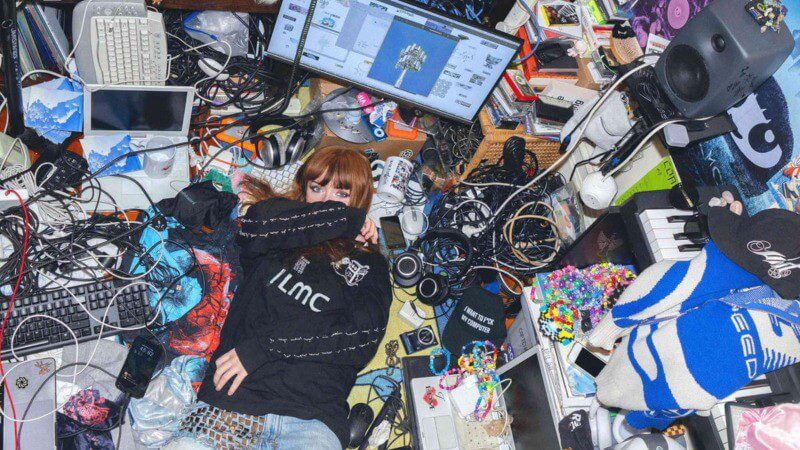The hard truth is, no matter how many albums we review each year, there are always countless releases that end up overlooked. That’s why, from now until the end of December, we’re bringing back our No Album Left Behind series and singing the praises of our favorite underrated records of 2025.
My parents got me a MacBook Pro for my 13th birthday. This was before phones were completely overtaken by the internet (I clung to my emotional support LG enV2 for far too long), so getting a laptop still felt like I was leveling up into a new, connective frontier I could journey through from the safety of my bedroom. I scrolled Tumblr religiously, yearning and longing and reblogging late into the night, teaching myself HTML to ensure I had the most aesthetically pleasing blog possible. I learned makeup tricks I still use from Macbarbie07 and madisenrosebeauty1’s YouTube videos, made endless collages and mood boards on Polyvore, and watched every single episode of America’s Next Top Model that existed at the time. Turns out I was built for this shit.
Nina Wilson’s computer gave her the means to become Ninajirachi. She taught herself composition, production, and songwriting on GarageBand and FL Studio. She foraged platforms like YouTube and SoundCloud, pulling inspiration from everything the internet put in her path (mega pop stars like Lady Gaga just as much as the esoteric electro-duo PNAU). After a steady succession of EPs since 2019, Ninajirachi released her debut full-length, I Love My Computer, in August. Since then, the album has won the Australian Music Prize and ARIAs for Best Solo Artist, Breakthrough Artist, and Best Independent Release. It’s an ode to the technology that allowed Wilson to become the artist she is—a celebration of the boundlessness of the internet summed up in the first track’s thesis: “Anythin’ is possible with fingers, eyes, a mouse, and a screen.” It’s a fitting paean to the machine that ignited her entire artistry in the first place.
I Love My Computer teems with zillennial nostalgia, both in subject matter and sound. It’s autobiographical, with Wilson telling the story of her musical coming-of-age, thanking the computer that made it possible. It’s a meta, ultradevotional, music-about-music record, and the fact that it was created entirely on a computer is the point. There are only so many of us who grew up in a time before parents realized iPod Touches were basically phones, and Wilson writes from inside that exact window of unsupervised digital childhood.
Much of the record carries the DNA of early 2010s EDM and electronica, the era of blown-out beat drops and maximalist production that imprinted differently when you heard it at 11 instead of 21. I Love My Computer sounds like the natural result of that kind of early exposure—elastic, impressionable. It makes me think about the first time I heard the A-Trak “Heads Will Roll” remix (I was ten) and how, in that moment, I learned that a song actually could swallow you whole. Now, Wilson takes those same grating, head-bashing sensibilities and Gen Z-ifies them. This is your adolescence on EDM. “ฅ^•ﻌ•^ฅ” and “All I Am,” originally one track, loop “Yeah yeah yeah”s that I’m convinced (but cannot confirm) sample Diplo’s “Revolution,” the former building from gentle acoustics into a similarly full-body drop.
I Love My Computer is one giant mix—a hyperpop/electroclash/EDM mega-hybrid constantly shifting, both between and within its songs. The music is so endlessly frenetic that you don’t even have time to think about breathing. “Battery Death” is pure anarchic, Zedd-era maximalism; “Delete” could easily slot into the how i’m feeling now tracklist or a PC Music compilation. “London Song” opens the record with a blown-out, crunchy, what-The-Dare-thinks-he’s-doing kind of bass thump. Wilson delivers the “I’ve never been to London, and that’s the truth” lines sprechgesang-style, warping, chopping, and mutating the words alongside a glitchy, skittering beat until it becomes something restless and shapeshifting. It bleeds right into “iPod Touch,” a cutesy, sped-up bop referencing not just the titular device but its Pikachu case and the tiny rebellions it enabled. The song is fittingly youthful, carrying the same energy as singing out loud when you’re left home alone for the first time. Wilson’s rushed delivery adds to the urgency without losing innocence; it reminded me of my aquamarine Nano, the one I graduated to after my BRAT green Shuffle.
Then the mix slams straight into “F**k My Computer,” a full-out Project X, Steve Aoki-style thrasher. It’s Wilson wanting to merge minds with her machine, ascend creatively by fusing with the thing that raised her artistically. That intense, obsessive relationship between Wilson and her computer reverberates through the rest of the album (we even get the machine’s POV on “CSIRAC”). I Love My Computer hits even harder once Ninajirachi widens the scope: the generational anxieties and traumas (seeing beheading videos against your will in the mid-2000s on “Infohazard”); the unspoken rituals and customs (flirting via Instagram Story on “Delete”); the hyperspecific codes that late-’90s babies just instinctively recognize. Some of her clearest writing happens in her least wordy songs. In the full-body effect of her brash, bombastic sound, she shifts between Flume-era hedonism (“All At Once”) and catchy club pop (“It’s You”). It’s what makes the LP feel like an unearthed 2012 mixtape—party songs from a bygone internet era.
The emotional center of gravity shifts on “Sing Good,” taking meta one step further: singing a song about singing songs. It functions as a snapshot of Wilson’s instinctive pull towards songwriting itself, with the computer acting as a vessel for all of that creative energy (whether she’s Googling song structures or tinkering in GarageBand). She briefly unplugs her synapses from the USB port to spell out the crux of Ninajirachi: a commitment to digital craft at a time when analog skill was still treated as the gold standard. Wilson’s willingness to trust her machine and to trust her impulses is what connects the kid hunched over a laptop to the producer orchestrating electronic maelstroms in a studio. That arc gives I Love My Computer its elastic sense of depth, sprawling past its own edges while keeping her earliest influences and her singular experiences close. By sidestepping the traditional skill hierarchies she inherited, Wilson shapes a unique and fascinating EDM/electronica world. Ninajirachi is both the multiverse and its maker, possessing the all-consuming scale and the singular perspective, both of which anchor I Love My Computer from the inside.




